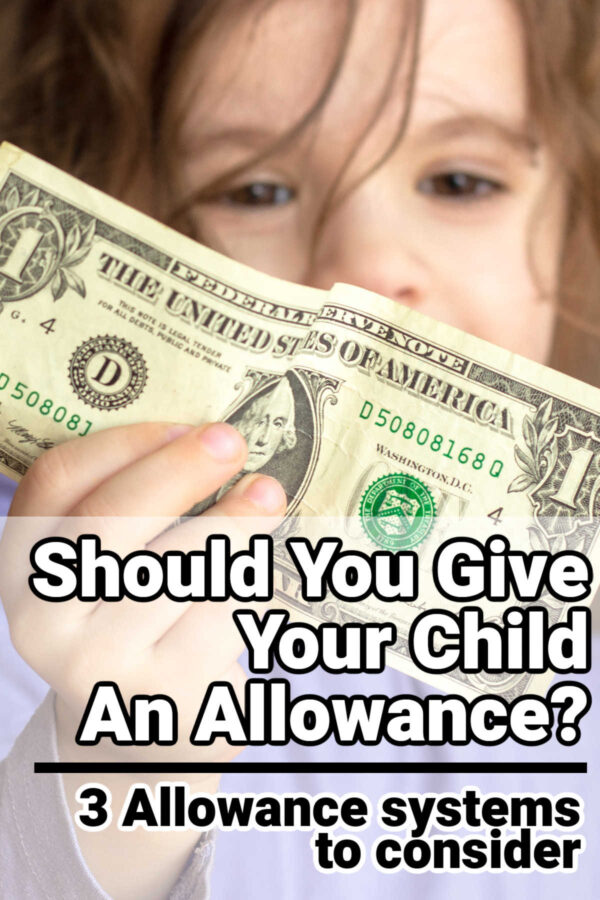There comes a time when you will be asking yourself the question: Should I Give My Child an Allowance? It is a topic that comes up often on my Happy Hooligans Facebook Page, so today, we wanted to talk about this very thing.

Allowances have a great place in a child’s life, but it’s not for everyone. Many parents are unsure of whether or not they should give their child allowance as a means to teach budgeting and responsibility, or if they should hold off and teach them that they do their chores, simply because they are a part of the family. Some parents see allowances as a teaching tool, while others see it as an open door to greed and want. It is a hard decision and only you know what is right for your child.
I know that there are many different views on giving a child an allowance or not. Here were the three main viewpoints from parents who follow our Happy Hooligans’ Facebook page.
The No Strings Attached Allowance (for budgeting reasons)
The first theory of is what I refer to as the “just because” allowance. In this situation, parents give their children a set amount of money on the same day each week. There are no strings attached, no chores charts to be completed, no grades to be earned – it’s just money that’s free and clear.
One mom explained that her family does this to teach the children about budgeting and saving up for things they want to buy. For her children, there are three jars into which they must place their allowance – spend, save, and give (to charity). The kids are allowed to spend their “spend jar” money however they like, but once it’s gone for the week, it’s gone.
This mom said that the only things she buys for them now are birthday and Christmas gifts and the items they need for the beginning of the school year. Everything else that the kids want must come from their allowance money.
The Chore Payment Allowance (for responsibility reasons)
For several other families, allowance is earned through chores, report card grades, and reading. This is the “chore money allowance” system that is paid out at the end of the week based on the completion of chores.
The belief here is that it teaches children the value of work and encourages them to develop a strong work ethic at an early age. Parents of older children indicated that they pay in cash or directly deposit the money in their child’s bank account. For young children, the money is paid out in the form of a ticket system where they earn tickets that can be redeemed instead of actual cash. One mom joked that her three year old daughter loses toys and can only imagine how quickly she would lose a quarter, so she uses “Chore Bucks” instead.
Some families pay per chore, others pay only upon completion of all chores, and some even take money away for chores not completed. Allowance money can also be earned by receiving good grades in school or each time a book is read.
RELATED: When Chore Charts Don’t Work.
Some moms indicated that they pay up to 50 cents per book that their child reads to encourage more reading and less screen time. (You’ll find our favourite books for kids 8-16 here). There was debate about what else a parent should buy for the kids after the allowance money has been given, but most moms agreed that it was up to the kids to save for the things they wanted.
No Allowance Camp (No money is given)
In this camp of thought, there is no allowance given at all. Chores are not rewarded with money, because they’re what’s expected of everyone living in the household.
As one mom said, “Why would I pay my kids to clean up after themselves when they made the mess?!” Good grades and reading are also typically not paid for in these households. When kids want something, they must ask mom and dad who decide whether or not to purchase it for them.
In some cases, money can be earned through special jobs like washing the car, raking leaves, or shoveling snow. These tasks are separate from the expected daily and weekly chores. While the money from mom and dad may not be as abundant, it does make kids think outside of the box for ways to earn some extra spending cash.
What does science say?
I looked into it, curious what the studies show, and according to TIME and educator Lewis Mandell, “Allowance systems are effective only when they afford the possibility for discussions about finances within the family, such as why and how families make the financial decisions they do. And even then, the conversations could be effective on their own even without giving over the money. Unfortunately, very few parents today have the time, patience, expertise and willingness to have the correct conversations with kids. So, allowance continues to be mishandled. Given the choice between a mishandled allowance and no allowance, I’d choose no allowance every time.”
Which should you choose?
No matter which theory of allowances you subscribe to, there is merit in each. The most important thing is to choose an allowance system that works best for your family and be consistent with it. Childhood is short. Make the most of it!
RELATED POSTS:
Solutions to Stop Sibling Fighting

Jackie is a mom, wife, home daycare provider, and the creative spirit behind Happy Hooligans. She specializes in kids’ crafts and activities, easy recipes, and parenting. She began blogging in 2011, and today, Happy Hooligans inspires more than 2 million parents, caregivers and Early Years Professionals all over the globe.









Leave a Reply